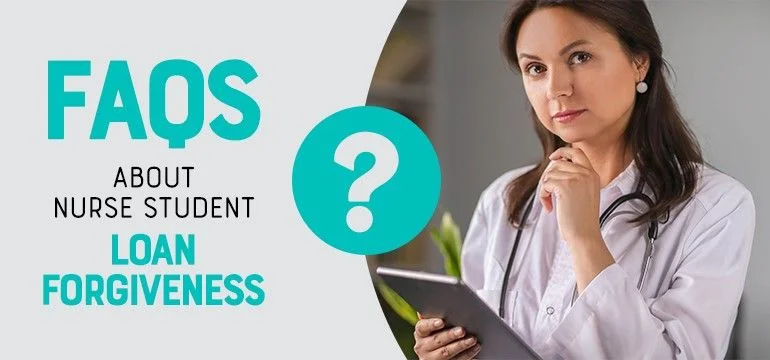
Choosing nursing as a career is a great way to serve those in need along with making a good living. When you are in nursing schools, you can face a large sum of student debt loans.
Accruing student debt is almost inevitable when you are pursuing your degree as a nurse.
However, the good thing about working as a nurse is that there is a high probability of receiving loan forgiveness in contrast to other professions.
From programs designed for students to speciality programs for nurses, there are a variety of possibilities to pursue your career in nursing.
The need for nurses is so high. Therefore, in order to attract new nursing candidates, many states are coming with student forgiveness grants.
As per the American Association of Colleges of Nursing, 57% of nurses planned to leverage from the Public Service Loan Forgiveness program, or PSLF to reduce their debt.
Loan forgiveness primarily means that after certain period of time, or if you meet certain requirements, the person who borrows a loan is not liable anymore to repay some or all of the balance principal amount or the interest owed by the students.
Irrespective of the kind of loan forgiveness you are granted, you will still be required to pay any income tax on the amount that is forgiven.
The eligible nursing careers solely depend on the requirement of the loan forgiveness program. You will come across programs that provide assistance to general nursing, while others specifically cater to advanced specializations.
Regardless of your education, make sure you pursue your career from an accredited nursing school and your license is valid without any restrictions.
It is important to note that there is no such guarantee that you will be granted a loan forgiveness.
Thereby, no matter what career path you wish to pursue, make calculated decisions by doing your thorough research before, during and after schooling and employment.
Some popular student loan forgiveness programs include:
Those nurses who are working for non-profit organizations or governmental bodies are eligible for Public Service Loan Forgiveness.
In order to qualify for PLSF, you don't need to be any specific type of nurse. Your employer will qualify you for the program, not your job.
PSLF is offering tax free forgiveness for all federal direct loans once you make 120 eligible payments while working full time for your qualifying employer.
However, private loans are ineligible. It is assessed that PSLF is the best option for nurses who desire student loan forgiveness.
The US government at this point has two options to help students will all kinds of student loans to overcome a chunk of the federal debt, where the primary option is the Public Service Loan Forgiveness (PSLF) Program.
In order to leverage from the program, you must meet four distinct requirements regarding the type of loan you wish. The requirements primarily focus on your employer, repayment plans, as well as the number of qualifying payments.
The National Health Service Corps Loan Repayment Program (NHSC LRP) is offering debt relief to all those eligible nurses who have at least 2 years part time or full time primary, mental healthcare or behavioral practice in a Health Professional Shortage Area.
With this program, you can receive almost $50,000 to payback your student loans. However, the only downside is that only a few nursing disciplines qualify for this grant.
In order to be eligible to receive loan forgiveness from NHSC, LRP, you must have a master's degree along with a national certification as a psychiatric nurse specialist, nurse midwife, or nursing practitioner.
A nursing practitioner should work in the following nursing specialties:
If you don't qualify for any of the student loan forgiveness programs mentioned above, you can still receive some relaxation.
Some healthcare organizations and hospitals offer loan forgiveness and tuition assistance to lure in or attract top talent.
The best way to go about this situation is by seeking the help of the HR department and see what they can offer.
Similarly, you can also opt for nursing career with the military. Many military wings offer sign on bonuses and loan repayment programs.
All wings have their own benefits and requirements, but in certain cases, you can receive more than $100,000 to apply for a student loan.

Registered nurses, members of nursing faculty, and nursing practitioners who work for high population areas or those areas where there is a shortage of nursing can qualify for up to 85% of loan forgiveness in compliance with the NURSE Corps Loan Repayment Program.
Those nurses who qualify can get 60% of their student loans forgiven if they serve for two years in an underserved region.
Another 25% could also be waived off if they work for three years. Moreover, some states also provide loan repayment assistance.
If you want to opt for the shortest route to get your loans waived off, you will want to opt for the 10 year student loan forgiveness. This can only be granted to those who opt for the PSLF program.
This is only available to government and non-profit workers who are eligible for a 10 year student loan forgiveness after making 120 payment. It needs to be noted that the payments don't have to be consecutive. Further, to qualify for this grant, you need to be on the IDR plan and make normal payments.
If you miss your student loan instalment, your credit score will get affected making it more difficult for you to borrow money in the future.
Apart from the credit score, the primary repercussion of failing to pay off your student loan depends on if they are held by the private student loan company or federal government.
Yes, your nursing license can be revoked if your student loans are not paid on time.
Some hospitals may choose to shoulder student loans for their personnel, especially those who have demonstrated exemplary service.
But this is usually a special program, so not all hospitals have this perk. You may inquire about any loan forgiveness program with your HR or administrative office.
As per the federal student loan provider's estimation, it will take 10 years for students to pay off their loans. This is the timeline to pay off with a standard repayment plan. In reality, the amount of time needed for borrowers to pay off their student loan is much longer.
As per recent research, an average college graduate with a bachelor's degree takes more than 21.1 years to pay off his student debt.
Student loans is one of the concerns faced by governmental bodies, but it is not likely to be dealt anytime soon. 69% of new college enrolments have a student loan debt and 43 million American owe $1.5 trillion in federal student loan debt.
Student loan has an effect on credit scores and credit reports including your FICO scores. This functions the same way as your other debts on your credit report.
When your credit score is calculated, your account information, loan amount, monthly payment history and your payment history is taken into consideration.
Even if your loan is differed and you have not started making payments, your lender will take the total amount into consideration and eventually have to repay while determining if they think you are in a good position to repay your loan.